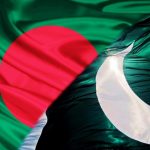 While the bilateral trade between the two countries has been growing slowly over the past years, there is no doubt that some scars have yet to heal. Here is an excellent piece published in The Independent which serves as a stark reminder of our past. Something that we, the team at New Pakistan, think would serve as a good replug for our readers:
While the bilateral trade between the two countries has been growing slowly over the past years, there is no doubt that some scars have yet to heal. Here is an excellent piece published in The Independent which serves as a stark reminder of our past. Something that we, the team at New Pakistan, think would serve as a good replug for our readers:
DHAKA, MAR 24: The Pakistan government should formally apologise to the people of Bangladesh for the atrocities committed by Pakistan occupation army during the War of Independence in 1971, Salima Hashmi, daughter of Pakistani late poet Faiz Ahmed Faiz said in Dhaka on Sunday. “My father wrote a number of poems on the genocide committed in Bangladesh. He expressed the sufferings faced by the people in 1971,” a visibly emotional Hashmi said while talking to the Independent after receiving the “Bangladesh Liberation War Honour Award” at a ceremony in the city.
“I was overwhelmed with emotions while coming over to Bangladesh and receiving the award on behalf of my father,” the daughter of the renowned Pakistani poet, who was outspoken on the atrocities committed by the Pakistani occupation forces during the 1971 Liberation War of Bangladesh, said.
The Pakistani government repeatedly warned my father for writing in favour of Bangladesh’s freedom struggle. We did not know much about the atrocities committed by the Pakistani Army, as information was not passed by the military personnel, she recounted.
Welcoming the present Awami league-led government’s initiative to honour the foreign friends for their outstanding contributions to the Liberation War of Bangladesh, she said: “Pakistani women have already apologised to the women of Bangladesh for the ill-treatment they received at the hands of the Pakistani army.”
Asma Jahangir, a renowned human rights activist of Pakistan and daughter of the late Malik Ghulam Jilani, then vice-chairman of the West Pakistan Awami League, also received the award on behalf of her father in Dhaka yesterday. “It’s a positive step taken by the Bangladesh government. It’ll strengthen Bangladesh’s relations with different countries,” she observed.
The recipients of “Bangladesh Liberation War Honour” and “Friends of Bangladesh” have thanked the Bangladesh government for bestowing the honours upon them for their outstanding contributions during the Liberation War. Some of them shared their emotions with The Independent on Sunday.
The Bangladesh government honoured 68 foreign nationals, as well as an organisation, in the sixth phase of honouring the country’s foreign friends.
Dr Amiya Kumar Chaudhuri, an Indian national, thanked the government for recognising their contribution in the 1971 War of Independence. He was an active member of the Calcutta University Shahayak Samity during the Liberation War. He used to collect funds for Bangladeshi intellectuals by arranging cultural events. “It’s really a remarkable moment for us. We highly appreciate the Bangladesh government’s initiatives to honour its foreign friends,” he said.
Chaudhuri organised a number of seminars to impress upon the then Indian prime minister Indira Gandhi the need to recognise Bangladesh’s struggle for freedom.
“We arranged many seminars to mobilise public opinion in favour of Bangladesh. Despite financial problems, we continued the movement to support the people of Bangladesh,” he added.
Dr Dhrubajyoti Lahiry, then a lecturer in Presidency College of Kolkata, was another member of the Calcutta University Shahayak Samity. He said they had extended all-out support to the refugees from Bangladesh. He also arranged seminars throughout India to create mass awareness about Bangladesh’s freedom struggle. “The award made me a little uneasy at first. But, at the same time, I feel happy that the government of Bangladesh has taken a landmark initiative to honour all foreign friends for their role during its War of Independence,” he said.
The undaunted spirit of Bangladesh’s freedom movement, and the tyranny, persecution and anguish suffered by her people were vividly reflected in the paintings of Prof. Dhiraj Choudhury. Appreciating the Bangladesh government’s initiatives, he said, “It would inspire young people contribute to the country’s cause.”
Choudhury, a former professor of Delhi Art College, said, “I arranged a solo exhibition on the theme ‘Happenings and inheritance of Bangladesh’ in 1971. It created public awareness in favour of Bangladesh in the global arena and raised funds as well.”
Dr Tomio Mizokami, professor emeritus of Osaka University of foreign studies in Japan, expressed deep gratification after receiving the award. “It’s remarkable. It’s difficult to express in words. I feel honoured to have received such a prestigious award,” he said.
“During the Liberation War, I came to know about the atrocities committed by the Pakistani Army through print and electronic media outlets. I, then, decided to do something for the oppressed people of Bangladesh,” he added.
“I started collecting funds in Japan. I also shipped food and other essential commodities to the distressed people,” he recalled.Munshi Mohammad Fazle Kader expressed his gratitude to Bangladesh for receiving the award.
“I’m a simple person. It’s a lifetime achievement from Bangladesh,” he said.An eyewitness war of the Liberation War, he added, “I was working at the deputy high commission in Kolkata in 1971. I’m one of the persons who raised the national flag of Bangladesh at the deputy high commission in Kolkata.”
“The oppression of the Pakistani army against minorities, and the Bangladesh people, inspired me to work in favour of the Liberation War of Bangladesh. I prepared documents, distributed letters and leaflets and participated in meetings and processions to raise voice against the atrocities committed by the Pakistani Army,” he added.
![]()






Why do soldiers rape women of the countries they just annexed?
http://content.time.com/time/magazine/article/0,9171,877316,00.html Time Article from 1971 http://www.bbc.com/news/world-asia-16207201 http://new-pakistan.com/2013/04/01/pakistan-should-apologize-to-bangladesh-salima-hashmi/ Pakistani human rights acti…
Comments are closed.